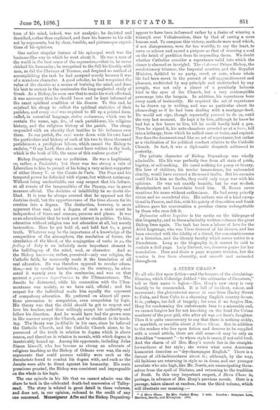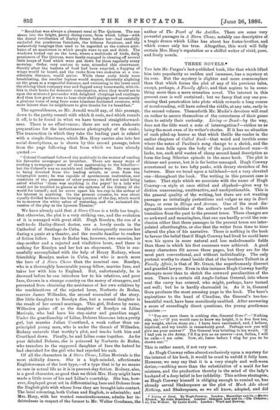A STERN CHASE.*
To all who live upon fiction—and the keepers of the circulating- libraries, which Coleridge dubbed "the ordinaries of literature," tell us their name is legion—Mrs. Hoey's new story is very heartily to be commended. It is full of incident, colour, and movement ; the plot-interest moves at ease from Harley Street to Cuba, and from Cuba to a charming English country-house. It is, perhaps, too full of tragedy ; for even if we forgive Mrs. Hoey for condemning the unfortunate Ines to a miserable end, we cannot forgive her for not knocking on the head the Cuban murderer of the poor girl, who after all was not lass's daughter. Then it is quite unnecessary to say that there is nothing sickly, or mawkish, or maudlin about A Stern Chase. But in addition to the readers who live upon fiction and deserve to be supplied with a sound article, there are still some—it may be only an Arnoldian "remnant "—to whom style is sauce, if not solid food. And the charm of all Mrs. Hoey's novels lies in the straight- forwardness of her style ; she writes what some American hamonrist describes as "dry-champagne English." There is a flavour of old-fashionedness about it ; although, by the way, old fashions are returning in style as in dress, and our younger novelists who aim high, like Mr. Norris, are emaucipating them- selves from the spell of Dickens, and returning to the tradition of Scott. In this very important respect, A Stern Chase is, perhaps, in advance of Mrs. Hoey's previous novels. Here ie.& passage, taken almost at random, from the third volume, which will illustrate our meaning :— • A Stern Ohne.. By -Mrs. Cashel Hoey. 3 vols. London : asiapson Low. Marston, Searle, and Horington. 1836. "Breakfast was always a pleasant meal at The Quinces. The sun shone into the bright, pretty dining-room, from which Lilias—with the dismal recollection of Harley Street before her—bad carefully excluded the ponderous furniture, the hideous furniture, and the melancholy hangings that used to be regarded as the correct attri- butes of an apartment in which people were to eat and drink. The windows looked out on the lawn, where a multitude of birds, daily pensioners of The Quirces, were busily engaged in clearing off several little heaps of food which were put down for them regularly every morning. Order, very curious to note, attended this observance. Shortly after the baskets of food had been emptied, a flapping of wings would be heard, and the rooks from two rookeries at a con- siderable distance, would arrive. While these early birds were breakfasting, the smaller legions would muster, discreetly alighting on the grass at, a respectful distance, and twittering in the trees until the shining black company rose and flapped away homewards, with tit- bits in their beaks for domestic consumption, when they would set-to upon the scattered provender with delighted chirpings and rustlings. And then how good it was to hear their shrill pipings and occasionally a glorious burst of song from some hilarious feathered creature, with more leisure than its neighbours to give thanks for its breakfast."
The agreeableness, as Mr. Arnold would say, of this passage, down to the pretty conceit with which it ends, and which rounds it off, is to be found in what we have termed straightforward- ness. There is no effusiveness ; there are not even elaborate preparations for the instantaneous photography of the rooks. The transaction in which they take the leading part is related with a simple directness, which Mrs. Hoey carries also into her social descriptions, as is shown by this second passage, taken from the page following that from which we have already q uoted :—
" Colonel Courtland followed the multitude in the matter of reading his favourite newspaper at breakfast.. There are many ways of reading a newspaper—some of them aggravating to the beholder— bat the Colonel's was an amiable and inoffensive way. He was open to being diverted from the leading article, or even from the telegraphic news ; he was capable of spontaneous inattention, and conscious of the presence of other persons ; he did not mind being asked whether 'there was anything in the paper' by a lady who could not be troubled to glance at the epitome of the history of the world for herself ; and he never upset hi tea-cup in the ardour of his interest in anything. On the present occasion, he was about equally divided between the burning question of the day, which would be to-morrow the white ashes of yesterday, and the animated dis- cussion of the play at the Lyceum Theatre."
We have already said that A Stern Chase is a trifle too tragic. But otherwise, the plot is a very striking one, and the evolution of it is managed with great skill. Hugh Rosslyn, the son of a well-to-do Harley-Street doctor, sees a lovely creole in the Cathedral of Santiago de Cuba. He subsequently rescues her during a panic at a theatre, and the results familiar to readers of fiction follow. Ines de Rodas has, however, two enemies, her step-mother and a rejected and vindictive lover, and there is nothing for Rosalyn and her but an elopement. This is suc- cessfully accomplished with the help of Henry Rodney, whose friendship Rosalyn makes in Cuba, and who is much more the hero of A Stern Chase than the nominal one. Rosalyn, who is a thoroughly honourable young fellow, marries Ines, and takes her with him to England. But, unfortunately, he is drowned before he can introduce her to his relatives, and poor Ines, thrown in a strange country on the mercy of strangers, and prevented from obtaining the assistance of her own relatives by the machinations of the rejected lover, Norberto de Rodas, marries James Willesden, the second scoundrel of the story. Her little daughter to Rosalyn dies, but a second daughter is the result of her second marriage. This girl, Dolores by name, Willesden palms off as the daughter of Rosalyn on Lilias Merivale, who had been his step-sister and guardian angel.
Under the guardianship of Lilies, Dolores blossoms into a pretty girl, but marries Julian Courtland, a weak rather than un- principled young man, who is under the thumb of Willesden.
Rodney unravels that worthy's plot, and tracks both him and Courtland down. Finally, he and Lilies come together. As for poor deluded Dolores, she is poisoned by Norberto de Rodas, who transfers to the supposed daughter of Ines the hatred he had cherished for the girl who had rejected his suit.
Of all the characters in A Stern Chase, Lilias Merivale is the most skilfully drawn. She is a high-minded, affectionate Englishwoman of the best type,—of a type that is by no means so rare in actual life as it is in present-day fiction. Rodney, also, is a good character, so good that we think Mrs. Hoey might have made a little more of his and Lilias's courtship. She has, how- ever, displayed great art in differentiating Ines and Dolores from the English girls with whose lives they are brought into contact. The local colouring, both Cuban and English, is admirable; and Mrs. Hoey, with her wonted conscientiousness, admits her in- debtedness in respect of the former to Mr. Walter Goodman, the author of The _Pearl of the Antilles. There are some very powerful passages in A Stern Chase, notably one descriptive of a tragic dream which Lilias has about her foster-brother, and which comes only too true. Altogether, this work will fully sustain Mrs. Hoey's reputation as a skilful writer of vivid, pure, and lively novels.



































 Previous page
Previous page